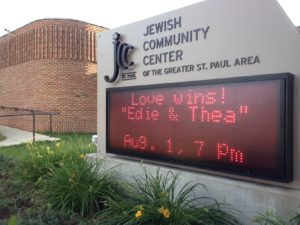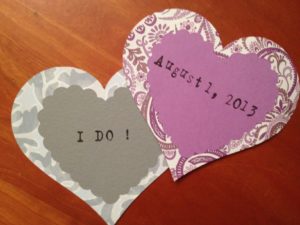 Siman Tov u’Mazel Tov. A good sign. Good luck.
Siman Tov u’Mazel Tov. A good sign. Good luck.
I have never cried at a wedding, but it took a lot of tissues to get me through August 1st.
Every photo that was posted, every church sign that read “All Weddings Welcome,” every person who greeted me with “Mazel Tov!” or “Congratulations!” or “Happy Marriage Equality Day!” and the florist who happily sold me some celebratory daisies saw tears spring to my eyes.
I didn’t get married on August 1st.
My partner and I are still talking about what marriage might mean for us, and the many sides of the whole concept of marriage historically and in social consequence today. We don’t know whether we want to be part of this particular institution. As I witness marriages and committed relationships, it isn’t marriage that magically brings about commitment, or love, or trust. Unhealthy relationships are not remedied by marriage, and committed relationships are not made less so for the lack of it. And then there is the new tax status and other legal issues brought about by having marriage equality in Minnesota, but not in every state in the union.
That’s why it surprises me that marriage equality moves me so much.
It must be as a friend of mine said at Pride this year: I might be a cynic when it comes to marriage, but I’m a romantic when it comes to equality.
To celebrate equality in Minnesota, on the evening of August 1st, I joined a small crowd at the Saint Paul JCC to experience the 2009 documentary, Edie and Thea: A Very Long Engagement.
Before the movie started, Barbie Levine asked if anyone in the room had gotten married that day. Two gentlemen in the back held high their newly ringed fingers and after some encouragement they stood to our cheers. We all joined in singing siman tov u’mazel tov. A good sign. Good luck. I looked around the room and saw a lot of grey hair. I was surrounded by same-sex couples who have been together for many years — probably decades.
The film is framed by Edie Windsor and Thea Spyer watching a slide-show of photos of their life together. Thea was born in Amsterdam in 1931, and in 1939 her family went to England to escape the Nazis. Later in the United States she was dismissed from Sarah Lawrence for being caught making out with a woman. Meanwhile, Edie was in New York beginning a career with IBM. She participated in group therapy with the goal of becoming straight – it didn’t work. They met in 1962, danced holes in Edie’s stockings, “just fit,” and kept holding on to each other for the rest of Thea’s life because they just “couldn’t let go.” Before too long, Thea proposed. Their engagement couldn’t be public, so instead of a ring Edie wore a circle of diamonds pin. When they married in Toronto in their 70s, they had been engaged for 41 years.
 Asked what guided her life, the married Thea, near the end of her life, her body paralyzed by Multiple Sclerosis responded, “Don’t postpone joy.”
Asked what guided her life, the married Thea, near the end of her life, her body paralyzed by Multiple Sclerosis responded, “Don’t postpone joy.”
Their story is about LGBTQ rights and equality. Their story is about access to health care. Their story is about family. Their story is about financial privilege. Their story is about many things. But most of all their story is about finding joy with someone and holding onto it with everything you’ve got.
In this film, directors Susan Kuska and Gréta Ólafsdóttir present a lovingly crafted documentary touched by events like the civil rights movement and the Stonewall riots. It is centered on the love story that became the core of the DOMA case.
For me, there is not enough explanation of Civil Rights or LGBTQ history. Although there are many historical events in the film, because they are never pointed out explicitly they are easy to miss. A few people commented afterward that subtitles would have really helped. I agree. Edie and Thea’s words are so rich and light and fun I didn’t want to miss a single one.
That said, it is a work of brilliant story-telling, and nothing gets in the way of the story. Edie and Thea are at the very center, just as they should be.
Every week when we make Havdallah my partner and I sing la’yehudim hayta orah v’simcha v’sason v’ikar ken tiyehah lanu which quotes Megillat Esther 8:16. There was light and joy, gladness and honor for the Jewish people. So may we be blessed.
Edie and Thea: A Very Long Engagement isn’t always a happy story. It is about two women who chose to live life together, all of it, and life is big and not always easy. It is certain, though, that they lived that life together with light and joy, gladness and honor and through their life brought about more justice and blessing for all of us.
Mazel tov, Edie and Thea. And for heaven’s sake, please pass me the tissues.

